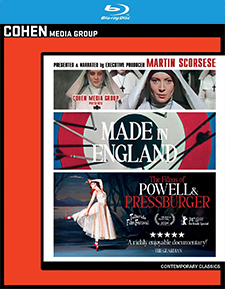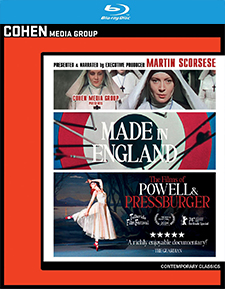Made in England: The Films of Powell & Pressburger (Blu-ray Review)

Director
David HintonRelease Date(s)
2024 (November 5, 2024)Studio(s)
Ten Thousand 86/Ice Cream Films/BBC Film/Screen Scotland (Cohen Media Group/Kino Lorber)- Film/Program Grade: A-
- Video Grade: A
- Audio Grade: A
- Extras Grade: N/A
Review
I wasn’t certain the premise of the new documentary Made in England: The Films of Powell & Pressburger (2024) was going to work. Though directed by David Hinton, the film is “presented” by Martin Scorsese, high-profile lifelong advocate of “The Archers,” as Michael Powell and Emeric Pressburger billed their collaborations. The film operates from the perspective of how their films were experienced by and shaped and influenced Scorsese’s own career and films. On home video particularly, Scorsese has been a near-constant presence, deeply involved in myriad laserdisc, DVD, and Blu-ray releases of their work for decades, doing introductions, audio commentaries and the like. Could a two-hour-and-thirteen-minute film offer anything new or insightful?
Yes, it turns out. While Made in England is expectedly rife with great clips from the Powell-Pressburger collaborations, as well as, also expectedly, Powell’s early “quota quickies,” and his later Peeping Tom and Age of Consent, made without Pressburger, the whole package plays well because the film allows time enough for Scorsese to dig deeper into his passion for the Archers’ films, and because Hinton’s film deftly integrates Scorsese and the film clips with lots of great interviews with Powell and Pressburger themselves, particularly of Powell in his later years, some startling behind-the-scenes footage, and other archival material. Its 133 minutes flew by.
At their peak, Michael Powell (1905-1990) and Emeric Pressburger (1902-1988) made movies—which jointly credited them as writers, producers, and directors—that were emphatically distinctive from all other cinema. Their best films are unlike anything anyone else made before or since. Even within their own filmography, their pictures are mostly completely different from one another. I think what first drew me to their films was they continually left me gobsmacked with their wholly original manipulation of structure and form. They didn’t tell stories as other filmmakers did, using the camera (in both black-and-white and Technicolor), editing, music, production design and everything else in wildly imaginative ways that resulted in completely new approaches to moviemaking. At the same time almost always, at their core, their films had compelling, sometimes deeply moving and powerful screenplays. As Scorsese puts it, their films embraced “cinematic theatricality” and “heightened intensity through artifice.”
One thing I liked about Made in England is how Scorsese describes first experiencing Powell-Pressburger films initially on the family’s 16-inch black-and-white television set (Hinton shows us recreations of those blurry images), partly because, in the early ‘50s, big Hollywood studios wouldn’t license their old films to television, but British film companies would. Only later did he experience the more-real-than-real 35mm nitrate Technicolor prints in New York movie theaters; the power of these films was only slightly diminished seeing them for the first time in less than ideal circumstances.
Partly Scorsese describes how specific moments in their works directly or indirectly influenced moments in his own films—in comparison clips from Mean Streets, Taxi Driver, and Raging Bull, among others—but that’s coupled with the fascinating story of Scorsese seeking out the nearly forgotten Powell in the 1970s, and their close friendship, made even closer when Powell married Scorsese’s longtime editor, Thelma Schoonmaker.
The film has lots of great interview footage with Powell, with Pressburger seen less often. Powell is witty and passionate and sometimes defiant, with Pressburger sometimes at Powell’s side, mostly content to let his former partner do the talking. But when Pressburger does occasionally speak up, his comments are always fascinating and amusing.
Some of the footage is startling: behind the scenes film on the set of A Matter of Life and Death, for instance and, later, making-of footage shot during Age of Consent. The expected Powell-Pressburger clips are present—the climax to Black Narcissus, the “one is starved for Technicolor” in-joke from Life and Death, the ballet from The Red Shoes, but there’s also some great footage from Powell’s The Phantom Light (1935), less-remembered works like The Small Black Room and unexpected snippets from the Archers films that made strong impressions on Scorsese.
Scorsese’s comments are always interesting, even where he and I disagree about particular films. He’s a little dismissive of the last Powell-Pressburger collaborations; I think The Battle of the River Plate is prime Powell-Pressburger though he considers it “conventional.” I admire the artistry and innovations of The Tales of Hoffman while also not liking it much as a film. In the end, though, Scorsese and director Hinton succeed in one of their clear aims: after watching Made in England, you’ll want to catch up with those Powell and/or Pressburger films you missed, and re-watch the classics all over again. Well, maybe not Oh, Rosalinda!!
Cohen Media Group’s Blu-ray of Made in England: The Films of Powell & Pressburger, distributed through Kino Lorber, presents the film in 1.78:1 1920x1080p widescreen, a good choice to accommodate the 1.37:1 standard format film clips, as well as the later widescreen formats the team utilized, including CinemaScope and VistaVision. Almost all the film clips look great, with only Ill Met by Moonlight (1957), the last of the Archers’ films, looking less than stellar. Hinton cuts together all this disparate material well, drawing the viewer’s eye to various parts of the screen. Audio is offered in both DTS-HD Master Audio 5.1 surround and 2.0 stereo mixes, supported by optional English subtitles. The disc is Region “A” encoded.
No extras, alas. Then again, one could look at the film as one giant extra feature all by itself.
Whether you’ve seen all, none, or just some of the Michael Powell and Emeric Pressburger films, Made in England works on several levels: as a tribute film, as a personal exploration through one admiring filmmaker’s eyes, and as a historical document tracing their work and artistry with plenty of insight that, even after all the exhaustive home video releases still seems fresh. Highly recommended.
- Stuart Galbraith IV

